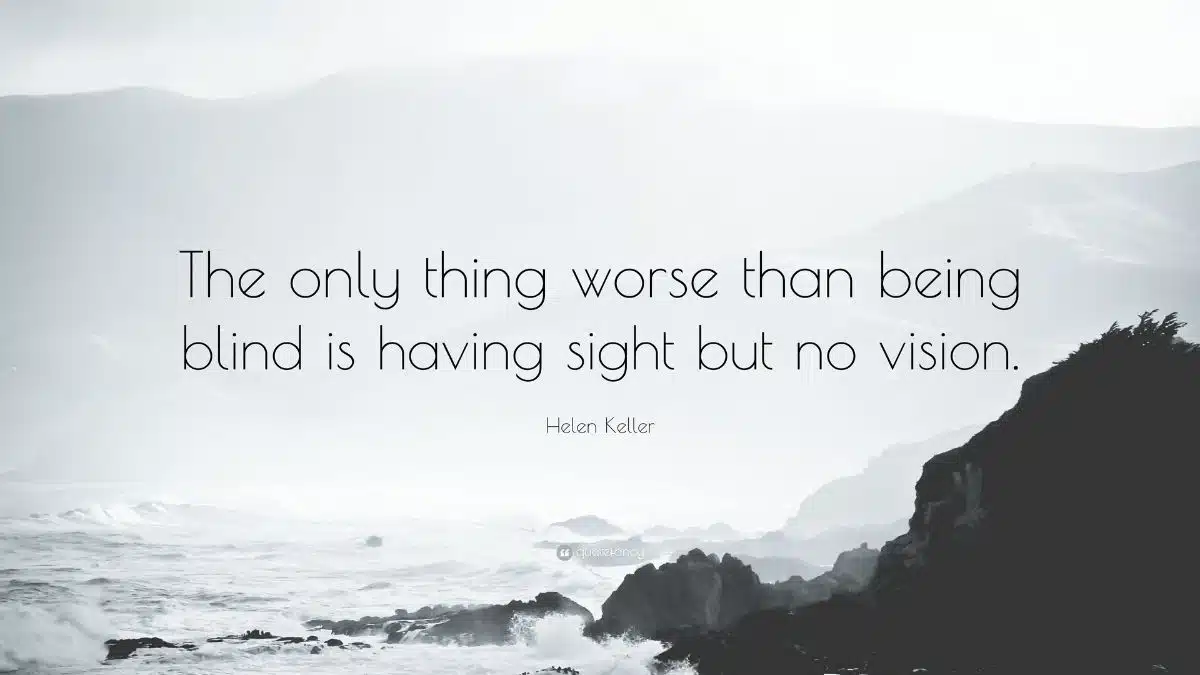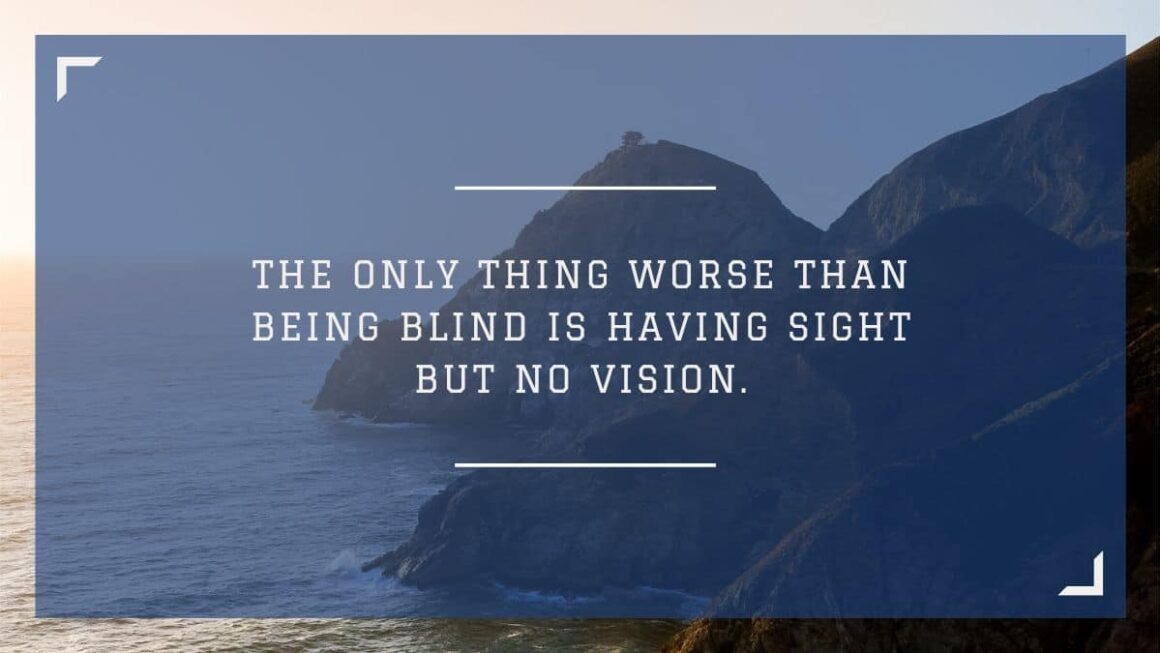Helen Keller, a remarkable figure who triumphed over her own blindness and deafness, once stated, “The only thing worse than being blind is having sight but no vision.” This poignant statement encapsulates the profound impact of lacking vision in life. While physical sight allows us to perceive the world around us, it is the presence of a clear vision that enables us to navigate our path with purpose, determination, and meaning. In this article, we will delve into the depths of this quote, exploring the significance of vision beyond mere sight and its transformative power in shaping our lives.
Defining Vision
Vision, in its truest sense, extends far beyond the ability to perceive the physical world through our eyes. It encompasses a deeper understanding and clarity of our purpose, goals, and aspirations in life. Vision provides us with a guiding light, a compass that directs our actions and choices. It is the lens through which we view the world, shaping our perspectives, decisions, and ultimate destiny.
While sight is the physical capacity to see, vision is the mental and emotional capacity to imagine and pursue a future that goes beyond the present moment. It is the ability to envision possibilities, set ambitious goals, and channel our energies towards their attainment. Vision is what gives meaning and direction to our lives, infusing our actions with purpose and our dreams with substance.
In essence, vision is the bridge between our present reality and our desired future. It is the embodiment of hope, ambition, and imagination. It invites us to dream boldly, think expansively, and take intentional steps towards manifesting our vision into reality.
Having Sight but No Vision
Having the ability to see the world around us through our physical sight does not automatically guarantee that we possess a clear and compelling vision for our lives. In fact, there are individuals who possess sight but find themselves lacking a sense of purpose, direction, and meaning. They navigate through life without a guiding vision, which can lead to a profound sense of emptiness and dissatisfaction.
- Purposelessness and Lack of Direction: Without a vision, individuals may feel adrift, lacking a clear sense of purpose and direction. They may go through the motions of daily life without a deeper understanding of their true aspirations and goals. This can result in a feeling of aimlessness and a constant search for meaning, leaving them vulnerable to being swayed by external influences or societal expectations.
- Indecision and Lack of Focus: A lack of vision can manifest as indecisiveness and an inability to make choices that align with one’s values and long-term goals. Without a clear vision to guide decision-making, individuals may find themselves stuck in a cycle of uncertainty and hesitation, unable to move forward with confidence and conviction.
- Stagnation and Lack of Growth: Without a vision, personal growth and development can stagnate. A vision acts as a catalyst for growth, inspiring individuals to set challenging goals, learn new skills, and expand their horizons. Without this driving force, individuals may remain stuck in their comfort zones, failing to tap into their full potential and experience the transformative power of growth.
- Lack of Motivation and Meaning: A vision provides a sense of motivation and meaning in life. It acts as a source of inspiration and fuels enthusiasm and passion. Without a vision, individuals may struggle to find the intrinsic motivation needed to pursue their goals and overcome obstacles. This can lead to a sense of emptiness and a lack of fulfillment, as they are unable to tap into their deepest desires and make a meaningful impact.
- Missed Opportunities: Having sight but no vision can result in missed opportunities for personal and professional development. Without a clear vision, individuals may fail to recognize and seize opportunities that align with their true potential and aspirations. They may find themselves drifting along a path that is incongruent with their values and dreams, ultimately hindering their overall fulfillment and success.

The Power of Vision
A clear and compelling vision has the remarkable ability to transform lives and shape the course of history. It serves as a driving force that propels individuals, organizations, and even entire societies to achieve extraordinary feats. Here are a few examples that illustrate the power of vision:
- Martin Luther King Jr. – Civil Rights Movement: Martin Luther King Jr. had a powerful vision of a future where racial equality prevailed. His famous “I Have a Dream” speech became a rallying cry for the Civil Rights Movement in the United States. King’s unwavering vision inspired millions of people to join the fight against racial discrimination, leading to significant advancements in civil rights and shaping the course of history.
- Steve Jobs – Apple Inc.: Steve Jobs had a transformative vision for Apple Inc. He envisioned a world where technology seamlessly integrated with human lives, providing innovative and user-friendly products. His vision drove the development of ground-breaking devices such as the iPhone, revolutionizing the way we communicate, work, and consume media. Jobs’ unwavering commitment to his vision propelled Apple to become one of the most valuable and influential companies in the world.
- Nelson Mandela – Apartheid: Nelson Mandela’s vision of a South Africa free from racial oppression and apartheid guided his life’s work. Despite spending 27 years in prison, Mandela never wavered in his commitment to his vision of a united, democratic South Africa. His perseverance and leadership eventually led to the dismantling of apartheid and his election as the country’s first black president, inspiring hope and reconciliation.
- Elon Musk – SpaceX: Elon Musk, the visionary entrepreneur, has a bold vision of making humanity a multiplanetary species. His company, SpaceX, aims to revolutionize space exploration and enable the colonization of Mars. Musk’s unwavering vision has led to numerous technological advancements in rocketry, bringing us closer to the possibility of interplanetary travel and exploration.
Conclusion
In conclusion, Helen Keller’s profound statement, “The only thing worse than being blind is having sight but no vision,” highlights the tremendous importance of having a clear and compelling vision in our lives. Vision extends beyond physical sight and encompasses a deep understanding of our purpose, goals, and aspirations.
Also Read: Faith is Taking the First Step Even When You Can’t See the Whole Staircase – Martin Luther King Jr.




